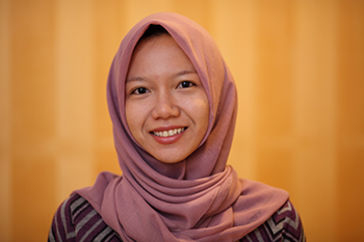PhD in Earth and Atmospheric Sciences
Current position: Researcher at the Indonesian Institute of Sciences (LIPI), Indonesia
Research focus: climatology and oceanography
During her research stay at GEOMAR in Kiel, Germany, Intan studied signatures of anthropogenic climate change on Indonesian seas over the past centuries by focusing on geochemical signals of coral skeletons. Corals build annual layers of calcium carbonate as they grow. The chemistry of this material locks in environmental conditions and makes it possible to track past changes such as temperature, rainfall, and ocean acidification.
Intan is also involved a lead author in the forthcoming IPCC's Sixth Assessment Report on Working Group I (The Physical Science Basis).
2019 National Geographic Women of Impact
2019 74 Ikon Pancasila by the Government of Indonesia
2018 LIPI Young Scientist Award by the Indonesian Institute of Sciences (LIPI)
2014 Best Young Scientist award by the IOC Sub-Commission for the Western Pacific, UNESCO
CV as submitted for the Green Talents award (2013):
Singapore-MIT Alliance for Research and Technology
Research focus: investigating anthropogenic signatures on regional climate and environmental changes via natural archives, such as corals and trees
As a Postdoctoral Associate in Paleoclimatology, Intan Suci Nurhati not only continues her endeavours to map climatic information, but is also passionate about spreading her rare expertise: human imprints on regional climate and environmental changes over the recent centuries.
Intan Suci Nurhati believes that Industrialisation might have made our lives a lot easier and efficient in many aspects; however, the topic of efficiency is hard to address when you consider its effects on climate.
“Economic developments since the Industrialisation era have improved the living quality of many, but unfortunately they come with externalities to the environment and consequently to our sustainable development plan,” Nurhati says.
In order to figure out the human imprints on climate change and environment, Nurhati took on the mission of studying and researching “natural archives”, such as corals and trees. Important to her research is the necessity of clearly observable climate data: part of the natural archive, such as sea-surface temperature, salinity and rainfall. With this knowledge in hand, Nurhati aims to characterise what long-term effects humanity has on the climate, thereby contributing to “our global collective effort to build resilient societies with a more sensible sustainable development.”
Having completed a BA at the prestigious Weslyan University, and finally receiving her PhD at the venerated Georgia Institute of Technology, Nurhati is currently an Assistant Professor at the Surya University in her native Indonesia.
Nurhati was selected by the jury for her excellent research in the field of paleoclimatology which contributes to a better characterization of human attribution to climate change. Her research approach is a successful example of interdisciplinary work with great social relevance. The jury also noted her outstanding commitment in communicating her field of research to the public and to policymakers.






